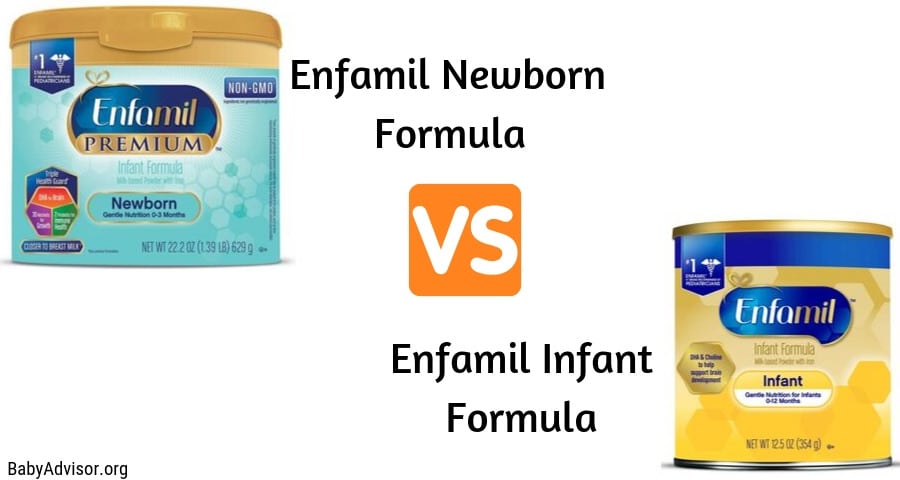
Do you need to purchase an age-specific formula for your baby? You can find many formula choices on the store shelves, and Enfamil is one of the leading brands, known for being safe and healthy for your baby. One quick look at the options shows that you have newborn and infant formulas, which might you ask what the difference is between Enfamil Newborn Formula vs. Infant Formula.
The differences between Enfamil Newborn and Infant is small, but there are differences along with similarities. Understanding these help you make the right choice for your baby.
Before we take a look, it’s essential always to remember that all baby formulas on the market contain the right amount of fats, vitamins, proteins, minerals, and more. Federal standards ensure that all formulas meet, at the least, the minimum requirements to ensure your child will grow. You never have to worry that any formula on the shelves, including generic, won’t help your child grow.
Is Enfamil a Good Brand of Formula for Your Baby?
Yes! Enfamil is one of the top recommended formulas by pediatricians. Their goal is to create a formula that is as close to breast milk as possible. So, if you decide not to breastfeed or unable to do so, rest assured that Enfamil puts all of their efforts into creating a baby formula modeled on breast milk.
One thing that we note is that Enfamil has a higher content of DHA than other formula brands, which helps to increase immune and neurodevelopmental outcomes.
A Look at the Enfamil Newborn Formula
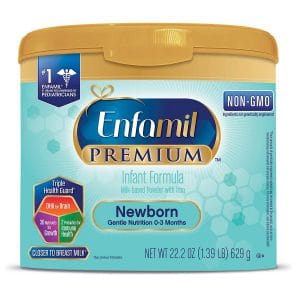
Experts suggest that babies need different nutrients based on when they’re born, so that’s why Enfamil divides their formulas into three categories: newborns, infants, and toddlers. Each group has different types of nutrient requirements to grow appropriately.
So, Enfamil Newborn is meant explicitly for newborn babies, and it should be given to babies for the first three months of their lives. This formula targets the differences in mother’s breast milk to help brain development.
Enfamil Newborn is the first and only line of baby formula to contain inositol. Inositol is a nutrient that you might not have heard about, but it’s considered a building block for your child’s brain. It’s the third most plentiful carbohydrate in breast milk, and inositol is at high levels throughout breast milk and colostrum.
So, when you select Enfamil Newborn, you’re providing your child with the closest amount of inositol that they’d receive if they were breastfeeding. Until this formula, it was only available to those exclusively feeding on breast milk.
Another critical difference is that Enfamil Premium Newborn contains two times the DHA, which is an essential fatty acid that helps to foster a baby’s learning ability. The DHA is equal to 0.32% of the total fatty acids.
Of course, that’s not the only significant feature of this formula. Here are some other things that you should note.
- It’s gentle and easy for your baby to digest due to the specific protein blend used. The ratio of whey to casein is based on breast milk 3-5 days after milk production begins.
- Enfamil used its unique Triple Health Guard blend.
A Look at the Enfamil Infant Formula
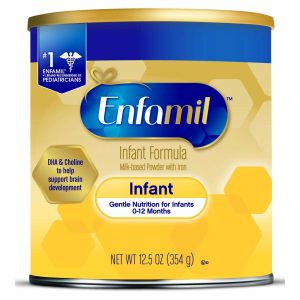
Enfamil put years of research into developing their Infant Formula line, based on breast milk and its ability to build the brain. They made sure that they met all of the nutritional requirements of infants, and it’s meant to be easy to digest, just like breast milk.
Just like their Newborn Formula line, Enfamil included the Triple Health Guard, which means the ingredients are not genetically engineered. It’s a brand that’s recommended by pediatricians and contains 2x Omega 3 DHA compared to competing brands.
We know that DHA is vital to maximizing learning potential in children. Enfamil also added a unique blend of prebiotics that helps to support and improve the immune system of your baby.
A few other essential features of the Enfamil Infant formula include:
- They use a different group of proteins that are less broken down, which makes it easier for gentle stomachs.
What Are The Major Differences Between Enfamil Newborn Formula vs. Infant Formula
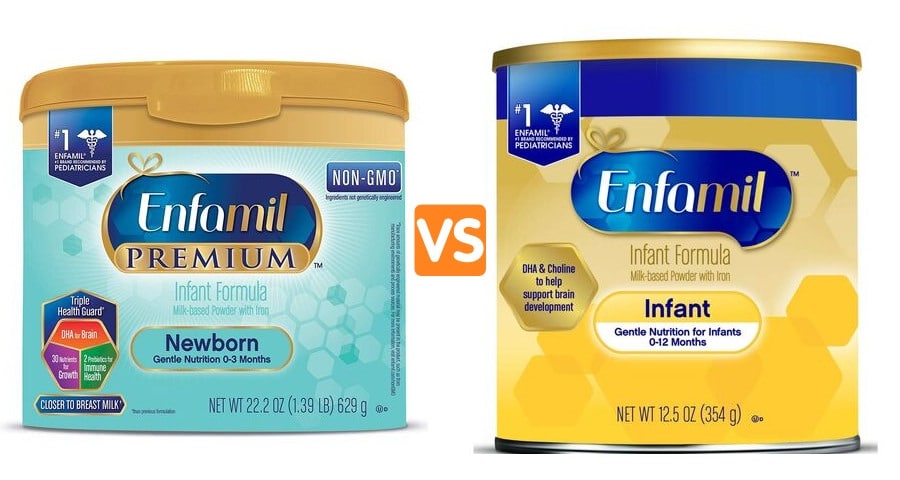
Now that you know the essential facts about these types of formulas, we have to look at the differences. The differences are what will help you make a decision about which formula is best for your baby.
| Enfamil Premium Newborn Formula | Enfamil Premium Infant Formula |
|---|---|
| It has the closest level of inositol when compared to breast milk. | It contains less vitamin D than the newborn version. |
| It’s designed for babies 0-3 months old. | This is for babies 0-12 months old. |
| The ratio of whey to casein is 80:20. | The ratio of whey to casein is 60:40. |
Switching from Enfamil Newborn to Enfamil Newborn
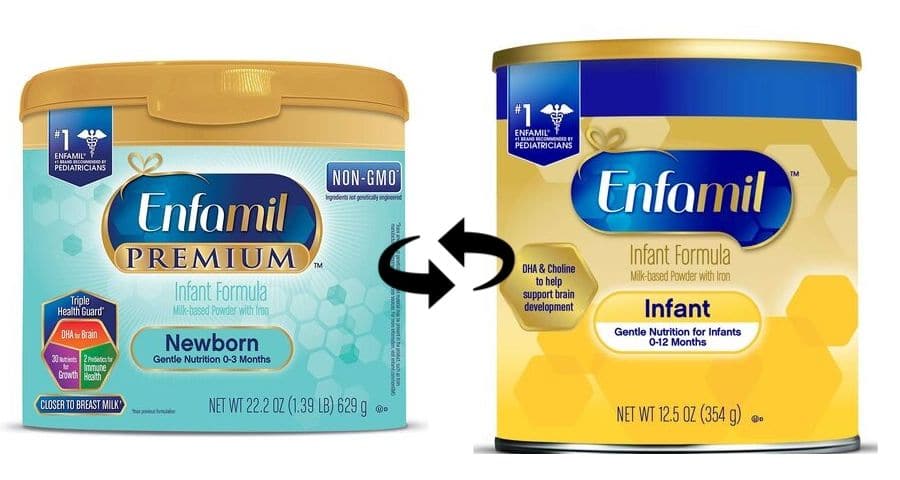
If you do decide to use the Newborn Formula, you’ll need to change your child to the Infant line by the fourth month. Remember the Newborn Formula is only meant for babies 0-3 months old.
However, Enfamil doesn’t give clear instructions on the best way to switch from the Newborn to Infant line. Your child might not present any fussiness at all, or your child might experience some changes when you switch between the two formulas.
Typically, you want to go by percentages for each formula. Here is an example:
- Day 1: 100% Newborn Formula
- Days 2-3: 75% Newborn Formula, 25% Infant Formula
- Days 4-5: 50% Newborn Formula, 50% Infant Formula
- Days 6-7: 25% Newborn Formula, 75% Infant Formula
- Day 8+: 100% Infant Formula
There is a chance your baby will be fussy and might wake up at night for more feedings. You might notice changes in gassiness or pooping frequency.
So, Is There a Winner?
Of course, you want to know who is the winner in this debate, but the truth is – It’s a tie. Both Enfamil Newborn and Enfamil Infant have pros and cons, and they have reasons you might use it or not. If you want to use a formula that is mainly meant for newborn babies, then the clear winner is Enfamil Premium Newborn Formula.
However, if you don’t want to switch as your child gets older, the best route is to go with the Enfamil Infant Formula. Make sure you add in a vitamin D supplement as well!
Let’s find out which formula is right for your baby. Read and find out the differences between Similac and Enfamil baby formula.
Final Thoughts
Always speak to your child’s pediatrician about the formula that you pick for your baby, and you can talk to your doctor about the right way to switch to a new formula when the time comes. Your doctor might have some good insight into the differences of Enfamil Newborn Formula vs. Infant Formula.
Always pay attention to your baby’s temperament and how he is handling the formula. If your baby is crying for hours at a time, having frequent diarrhea or constant constipation, talk to your doctor about finding a new formula.






